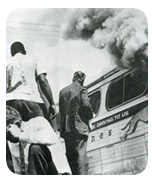
Freedom Riders
Freedom Riders Civil Rights activists rode interstate buses into the segregated southern United States to test the United States Supreme Court decision Boynton v. Virginia (of 1960). The United States Supreme Court's decision in Boynton v. Virginia granted interstate travelers the legal right to disregard local segregation ordinances regarding interstate transportation facilities. But the Freedom Riders' rights were not enforced, and their actions were considered criminal acts throughout most of the South. For example, upon the Riders' arrival in Mississippi, their journey ended with imprisonment for exercising their legal rights in interstate travel, and similar arrests took place in other Southern cities. Freedom Riders knew that they faced arrest by authorities determined to stop their protests and possible mob violence, and, before starting, they committed themselves to a strategy of non-violent resistance. The riders borrowed this strategy from Gandhi, which had first been used in America by Martin Luther King Jr during the bus boycott in Montgomery.